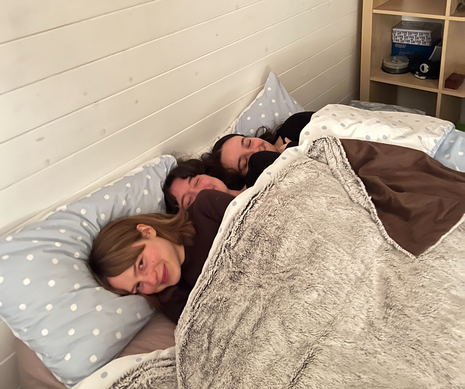How (not) to choose a flatmate
Home is where the heart is? Here’s your ultimate guide in what to look for – and avoid – in potential flatmates

Choosing people to live with for next year is a universal issue for first-year students across the country, a decision which is made with the help of the notorious ballot system in Cambridge. Admittedly, this decision is less significant for students here than for our counterparts at other universities; one of the many ways in which Cambridge students may consider themselves privileged is with regard to their housing in the second and third years of their degree. Accommodation is college-provided for the vast majority of undergraduates, avoiding issues with landlord exploitation. Much of the fierce competition for housing in student areas across the country, like those that mean Manchester students are forced to live in Liverpool and York students in Hull, is also bypassed. Nonetheless, even this form of living together comes with its problems – it’s almost impossible not to learn way more than you wanted to about the people you live with, from their toilet habits to their sex lives. You’ll likely struggle not to get on the wrong side of each other in a shared house or flat – after all, choosing a flatmate has the potential to go very badly wrong, and it’s hard to look at someone the same way after you discover their half-eaten kebab down the back of the sofa or when they’ve just combed their dandruff out over your corn flakes.
“A crime as inoffensive as singing ABBA in the shower can embitter even the best of friendships”
An inescapable problem with choosing a limited group of people to live with is people being left out. This issue is difficult to avoid given the arbitrary nature of the number of peers whom students can choose to live with - a number which unsurprisingly ignores the size of groups of friends. The groups of four offered by Trinity Hall in the ballot, for example, often lead to one or two people being unable to live with the majority of their friends, frequently causing tensions in friendships. While such issues in the choosing process are perhaps unavoidable, conflicts within the group who are living together are not. Issues over hygiene, cooking, cleaning, washing up and shared areas such as the kitchen and toilet can easily erupt into arguments, while a crime as inoffensive as singing ABBA in the shower can embitter even the best of friendships if your flatmate is in the middle of an online supo. Choosing the right people to live with is one of the easiest ways that these problems can be avoided.
“Even if they’re the life and soul of the party it doesn’t mean that they’ll be good at cleaning a shared toilet after a bad curry night”
The naive idea of friendship being the only important thing in choosing a flatmate is flawed; even if they’re the life and soul of the party it doesn’t mean that they’ll be good at cleaning a shared toilet after a bad curry night. Some experience of living together before (typically living on the same staircase), however, can be a useful indicator of compatibility in terms of living together, while having similar lifestyles can also be helpful. For example, the annoyance of being woken up by your flatmate coming back from the club at four in the morning can be avoided if you’re also coming back from the club at that time but can be significantly worsened if you need to be up by six for rowing.
Getting to know people’s habits is important: if you prefer your room to be a quiet space without distractions it’s best not to live next to somebody known for hosting parties, while if you’re going to be practising the saxophone every night it’s probably best to give your potential flatmates a bit of warning. Food preferences and cooking should ideally be discussed: it’s important to know if there’s going to be a rota for cooking meals and eating dinner together, going to college for hall dinner or whether you’ll be living off takeaways and ready-meals. Choosing people based on what they can do for you may seem selfish, and it probably is, but you’ll never complain about living with someone who’s an incredible cook, who absolutely loves doing the washing-up, or who is always happy to give you a lift somewhere.
Despite all of these factors, friendship may well be the most important part of your decision-making process. Having a stable friendship with the people you live with is vital; it’s almost unavoidable that you’re going to ashamedly eat each other’s food when you’re staying up late into the night during an essay crisis and the walk to Sainsbury’s seems like a marathon. Everyone is also going to leave dishes in the kitchen without washing them up at some point over the year. A strong friendship is important to make sure that these issues don’t result in more serious problems. Conflict resolution is also vitally important in these relationships; a friend who you struggle to confront and get things out in the open with is likely a bad choice of person to live with, as in such cases issues which should be left as everyday disputes may build up into longer-lasting enmity.
It must also be remembered that a large part of making things work with your flatmates is up to you personally. It is your responsibility as well to try and make things work for them – you can’t expect them to do everything! It’s also important to put things in perspective: at best, living with your friends can be amazing (imagine cooking and eating together, movie nights, relaxing in the kitchen or the common room), but even if worst comes to worst it won’t define your year or your university experience, and you can spend as much or as little time with your flatmates as you want to. It’s important not to get too worried about it and to remember that if everything goes a bit wrong your life will still carry on.
 News / Colleges charge different rents for the same Castle Street accommodation2 March 2026
News / Colleges charge different rents for the same Castle Street accommodation2 March 2026 News / News in Brief: waterworks, wine woes, and workplace wins 1 March 2026
News / News in Brief: waterworks, wine woes, and workplace wins 1 March 2026 News / Climate activists protest for ‘ethical careers policy’1 March 2026
News / Climate activists protest for ‘ethical careers policy’1 March 2026 News / Angela Merkel among Cambridge honorary degree nominees27 February 2026
News / Angela Merkel among Cambridge honorary degree nominees27 February 2026 News / Private school teacher who lied about Cambridge degree barred from teaching27 February 2026
News / Private school teacher who lied about Cambridge degree barred from teaching27 February 2026









